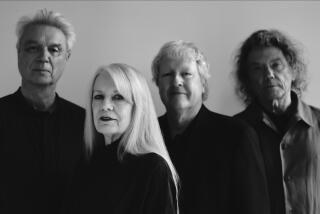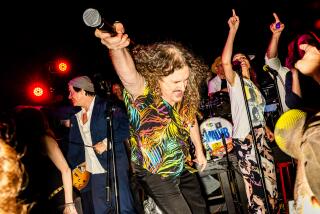BIG DADDY: THERE IS MUSIC AFTER LAOS
Bob Wayne, leader of the L.A.-based group Big Daddy, is ready to junk the Laos story.
Big Daddy, the story goes, was on a USO tour in Laos in 1959 when it was captured by communists, who held the eight musicians prisoner for 24 years. When it returned to the States to continue its career in 1983, the band naturally looked for current hits to perform. And, naturally, they performed them in the only style they knew: 1950s rock ânâ roll.
Thatâs an entertaining premise for Big Daddy recordings like âJump,â which fits the Van Halen anthem into the slapping rockabilly format of Eddie Cochranâs âSummertime Blues,â and Culture Clubâs âDo You Really Want to Hurt Me?â translated into agile street-corner doo-wop.
But, according Wayne, who leads the group at At My Place in Santa Monica tonight, the Laos legend âhas become a little bit of a burden. When we do interviews we often find that the story becomes so much a part of the interview that we never get to talk about the music or what the band does now or what weâre trying to do. Weâre more interested in talking about the future than what it was like to be tortured in Laos in 1961.â
The real story begins with Wayneâs involvement with various projects for Los Angelesâ offbeat Rhino Records, including recordings by Elvira and Wally George. Wayne was also a member of the labelâs infamous Yiddish People, which released the non-hit âMatzoh Man.â
Wayne and Rhino head Richard Foosâ discovered that they had a mutual fondness for an early â70s album by Godfrey Daniel, which featured contemporary hits done in â50s R&B; and doo-wop styles. Big Daddy broadened the concept to include the entire spectrum of vintage rock ânâ roll, recorded the âUnnatural Enquirerâ album and started performing around town. A second LP, âMeanwhile . . . Back in the States,â has just come out.
While some cuts seem slight and others forced, the best matches of song and style effectively redefine the material. âBillie Jeanâsâ sense of mystery is enhanced by its ominous âBe Bop a Lulaâ setting, âGirls Just Want to Have Funâ finds a new sweetness in a âDuke of Earlâ format, and âPurple Rainâ works surprisingly well dressed up as Buddy Hollyâs âNot Fade Away.â Big Daddyâs light, poignant interpretation of Bruce Springsteenâs âDancing in the Darkâ made the Top 20 in England.
These successes are some reasons why Wayne reacts violently to the term novelty.
âWhen somebody uses the term novelty , it means it wonât last,â said Wayne, who owns and operates a recording studio in Culver City. âI think when we had the hit in England, that song wasnât taken as a novelty by a lot of people. They just liked âDancing in the Darkâ as a song.
âWe donât mind it being called comedy music, but the term novelty has a real negative connotation in the music business, meaning it wonât sell. Certainly we want people to have fun with this--itâs obviously got some comedy to it. Then again, there are people that actually prefer our versions to the originals.â
Wayne & Co.âs ultimate goal is to develop the act into a âSha Na Naâ-style TV show. Meantime, there are the local dates, a long-term contract with Caesars Tahoe--and more hits to adapt.
â âThe Heat Is Onâ (by Glenn Frey) is one of them,â said Wayne, âand thatâs done like âFeverâ--a cross between the Little Willie John and the Peggy Lee. The other one is (Dire Straitsâ) âMoney for Nothingâ done like Tennessee Ernie Fordâs âSixteen Tons.â
âWeâre working on a â60s-â70s medley. It might start with Bob Dylanâs âThe Times They Are a-Changinâ â and go through the Beach Boys, the Beatles, maybe Jimi Hendrix--go through all the music we missed when we were away in Southeast Asia.â
More to Read
The biggest entertainment stories
Get our big stories about Hollywood, film, television, music, arts, culture and more right in your inbox as soon as they publish.
You may occasionally receive promotional content from the Los Angeles Times.








